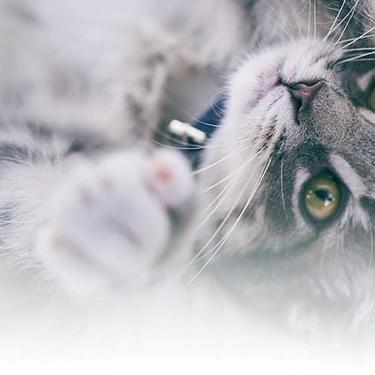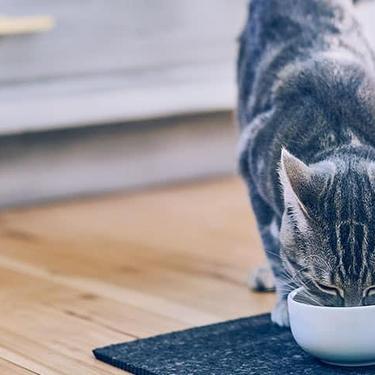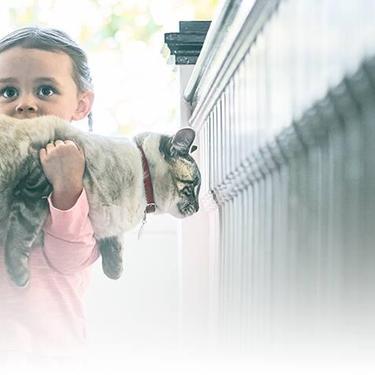
-
Find the right food for your petTake this quiz to see which food may be the best for your furry friend.Find the right food for your petTake this quiz to see which food may be the best for your furry friend.Health CategoryFeatured products
 Adult Large Breed Chicken & Barley Recipe Dog Food
Adult Large Breed Chicken & Barley Recipe Dog FoodSupports healthy joints, lean muscle, and beautiful coat for large breed dogs
Shop Now Adult Light Large Breed Chicken Meal & Barley Recipe Dog Food
Adult Light Large Breed Chicken Meal & Barley Recipe Dog FoodFewer calories for less active large breed dogs
Shop Now Hill's Science Diet Adult Healthy Mobility Large Breed Chicken Meal, Barley & Brown Rice Recipe Dog Food
Hill's Science Diet Adult Healthy Mobility Large Breed Chicken Meal, Barley & Brown Rice Recipe Dog FoodAdvanced nutrition shown to support joint health and improve mobility
Shop NowFeatured products Adult Sensitive Stomach & Skin Pouch Variety 12 Pack Cat Food, Chicken & Beef, Salmon & Tuna
Adult Sensitive Stomach & Skin Pouch Variety 12 Pack Cat Food, Chicken & Beef, Salmon & TunaCarefully made, gourmet daily nutrition. Tasty chunks with Salmon & Tuna in a decadent gravy. Supports digestive health, nourishes skin and promotes a lustrous fur.
Shop Now Adult Perfect Digestion Chicken, Barley & Whole Oats Recipe Cat Food
Adult Perfect Digestion Chicken, Barley & Whole Oats Recipe Cat FoodHill's Science Diet's breakthrough nutrition supports ultimate digestive well-being & healthy microbiome
Shop Now Adult Oral Care Chicken & Brown Rice Recipe Cat Food
Adult Oral Care Chicken & Brown Rice Recipe Cat FoodClinically proven kibble technology to reduce plaque & tartar build-up
Shop Now -
DogCat
- Cat Tips & Articles
-
Health Category
- Weight
- Skin & Food Sensitivities
- Urinary
- Digestive
- Kidney
- Dental
- Serious Illness
-
Life Stage
- Kitten Nutrition
- Adult Nutrition
Featured articles Adopting a Pet: What You Need to Know
Adopting a Pet: What You Need to KnowLearn the basics of adopting a pet, including where to begin and common questions you should ask yourself when deciding which kind of pet is best for you.
Read More Cat vs. Dog: Which Is the Best Pet for Me?
Cat vs. Dog: Which Is the Best Pet for Me?Learn about important differences between dogs and cats, such as cost & space considerations. These factors can help you decide which pet is best for you.
Read More Fun Ideas for Kids and Pets This Summer
Fun Ideas for Kids and Pets This SummerOutdoor summer activities with your dog or cat can be fun for kids, too. Learn how they also teach kids responsibility & creates a bond with their pet.
Read More -


Bad breath — it happens to the best of us, including our beloved feline companions. Although many cases of our morning breath can be solved with a morning brush routine, cat bad breath may indicate a more serious issue. Cat bad breath is often an indication of tooth and gum disease. However this isn’t always the case, as there are some diseases that can lead to bad breath in cats. To identify the problem it might be best to book a check up with your vet to understand what might be causing your cat to have bad breath.
Why Does My Cat’s Breath Stink?
Oral Causes
According to International Cat Care, 85% of cats have some form of dental disease. Dental disease starts with plaque. Plaque is that invisible furry stuff that is present on our teeth when we wake up in the morning. It’s made up of bacteria and saliva and if not removed it eventually hardens to become tartar which is the yellow material on our teeth. Both these things can lead to inflammation and damage to your cat’s gums, causing gingivitis. This can be a reason why your cat’s breath stinks. If not treated there will eventually be a loss of the supporting structures of the tooth leading to tooth loss. This all makes for one stinky and painful kitty mouth.
Further oral causes of halitosis (the scientific name for bad breath) in cats include oral tumours, abscesses and inflammatory gum conditions. Cats can also expose their teeth and gums to foreign objects from playing or eating non food items that can cause injury or oral trauma like a broken tooth. If you are worried that your cat has bad breath you should always seek advice from your vet.
Systemic Causes
The source of cat bad breath can't always be traced to the mouth. Some of the more common systemic causes of bad breath in cats are serious medical conditions that necessitate prompt medical treatment.
- Chronic kidney disease: Kidney disease (or renal disease) is one of the most common diseases that Vetwest Animal Hospital see affecting cats. Kidney disease is very serious, as the kidneys are essential for the health of your cat. As kidney function decreases, waste products, such as urea and ammonia, build up in the cat's blood. This may cause the cat's breath to smell like urine or ammonia.
- Diabetes mellitus: Diabetes mellitus is a disease of the pancreas and is a failure of certain pancreatic cells to regulate blood sugar. If your cat's breath s has a fruity odour, this is a sign of ketoacidosis, which may occur in diabetes. It's a potentially life-threatening condition and you must seek veterinarian advice if you suspect this condition.
- Gastrointestinal trouble: Breath that smells like faeces can occur with continued vomiting, especially when there is a bowel obstruction. Bowel obstructions are a medical emergency for your cat.
As you can see, there are many potential causes of bad breath in cats and it is not just a smelly inconvenience. While bad breath in people can be related to non serious causes, such as eating garlicky food, bad breath in cats can be a sign of a longstanding and serious condition which needs to be checked out. Luckily, there is often a solution.


Tasty Tips
Getting Rid of Cat Bad Breath: Home Remedies & Professional Tips
Firstly, it's important to understand what is causing your cat’s bad breath and to rule out that nothing more serious is going on with your cat’s health. Book an appointment with your vet before trying any at home remedy.
After visiting your vet there are a few options that you can try at home in order to get rid of your cat’s smelly breath. The goal is simple enough: establish cat breath that is free from offensive, stinky odours. If you are starting with a kitten with a healthy mouth, implementing a plan of good oral hygiene will be fairly simple, provided you are consistent and committed. Brushing your cat's teeth is an effective way to prevent the build-up of tartar. You should use toothpaste made especially for cats, which is available at pet specialty stores or your local vet clinic. You should also purchase a special cat toothbrush to make this task easier for your cat — and you! Brushing should be done several times weekly at a minimum, and ideally, daily. This can be a challenge with your cat at first, especially in the learning phase and you may need to persist with it. This is something that you should try and implement at a young age so that your kitten will get used to having their teeth cleaned regularly and they will learn in time that this is a safe and important practice.
You should also schedule a professional cat teeth cleaning with your vet at least once a year. This procedure will require them to put your cat under anaesthesia — this isn't just to make it easier for the vet to more easily navigate your cat's teeth while they are asleep, but teeth cleanings for pets often requires more extensive cleaning that a regular toothbrush just can't reach. This often includes removal of hard to reach plaque and tartar that may form underneath the gum line. Your vet may also recommend X-rays to look for broken or cracked teeth or resorptive lesions, which can be common among cats.
 If your cat has periodontal, or gum disease, your first goal is to treat the oral cause of the bad breath. A complete oral exam under anaesthesia is necessary to diagnose the cause and the extent, as well as correct it.
If your cat has periodontal, or gum disease, your first goal is to treat the oral cause of the bad breath. A complete oral exam under anaesthesia is necessary to diagnose the cause and the extent, as well as correct it.
If systemic disease is the cause of halitosis, your veterinarian will likely need to perform diagnostics to determine the cause. Once the cause is diagnosed and controlled, a home dental care routine should be established, and this will remain very important in order to maintain good oral hygiene for your cat. Hill's Prescription Diet t/d or Hill’s Science Diet Oral Care which has clinically proven kibble technology. Specific ingredients, such as sodium tripolyphosphate, and uniquely shaped and sized kibble have been shown to reduce plaque formation and tartar build-up, helping to maintain fresh breath for your cat.
There are oral care products and even foods to fight your cat's bad breath and dental disease. Feeding your cat, a specially formulated daily dental care food like
Remember, a neutral-smelling breath is a sign of a healthy mouth and a healthy cat and anything other than this is an issue that you must get checked out immediately with your local vet. The World Small Animal Veterinary Association reported that dental and oral diseases are by far the most common problem facing our pets today. It is clear if you work to maintain your cat's oral health then this will also help maintain their overall health too.
HIMA-SK-21194D7


One of our staff authors prepared this article for you
Related products

Delicious tender chicken and rice in a mouthwatering sauce with precisely balanced nutrition to support 5 essential building blocks for lifelong health

Clinically proven kibble technology to reduce plaque & tartar build-up

Carefully made, gourmet daily nutrition. Tasty chunks with Salmon & Tuna in a decadent gravy. Supports digestive health, nourishes skin and promotes a lustrous fur.

Hill's Science Diet's breakthrough nutrition supports ultimate digestive well-being & healthy microbiome
Related articles

Obesity affects more than 30 percent of cats in America. Learn how you can properly feed and exercise your cat to improve its weight management.

Understand the symptoms of a chronic upset stomach in your cat, and learn how to help sooth their discomfort.

Get helpful information on proper feline oral healthcare and why it's so vital to take care of your cat's teeth.

Provide the best possible treatment for cats with sensitive skin by spotting the signs, knowing the causes, and understanding the remedies. Learn more now.

Put your cat on a diet without them knowing
Our low calorie formula helps you control your cat's weight. It's packed with high-quality protein for building lean muscles, and made with purposeful ingredients for a flavorful, nutritious meal. Clinically proven antioxidants, Vitamin C+E, help promote a healthy immune system.
Put your cat on a diet without them knowing
Our low calorie formula helps you control your cat's weight. It's packed with high-quality protein for building lean muscles, and made with purposeful ingredients for a flavorful, nutritious meal. Clinically proven antioxidants, Vitamin C+E, help promote a healthy immune system.

